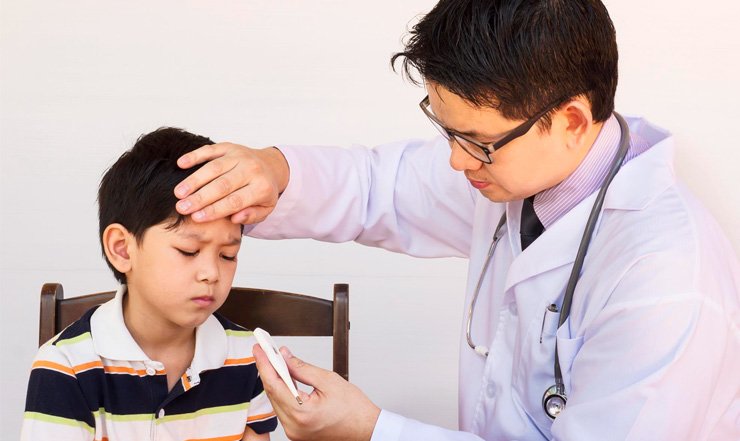Parents often take their kids to the doctor when they have a fever. A fever is usually a natural response to an infection, but it can be scary, especially for young kids. Every parent has to know when to be concerned about a fever and how to care for their child during this time. This guide is meant to make things clearer about the subject, such as when to call the doctor, possible problems, and good ways to manage the problem.
Understanding Fever in Kids
A fever is a short-term rise in body temperature that is usually caused by an illness. A fever in kids is usually thought to be a temperature of 100.4°F (38°C) or higher. There are several things that might make kids have a fever, including as
- Viral infections: This includes the likes of flu and colds that are the most prevalent cause of fever.
- Bacterial infections: It includes pneumonia, strep throat, and ear infections.
- Other illnesses: Mild fevers might also be caused by things like teething or getting shots.
When to Call the Doctor for Fever
You can usually take care of a fever at home, but there are some times when you need to see a doctor right once. Here are some rules for when to call the doctor for fever in your child:
- Infants Under 3 Months: If a baby less than three months has a fever, they should see a doctor right away. Their immune systems are still growing, which makes kids more likely to have serious illnesses..
- Persistent Fever: If a child’s fever lasts more than three days or comes back after going away, see a doctor to be sure there isn’t anything else wrong.
- High Fever: If your fever is over 104°F (40°C), you should see a doctor, especially if you have additional worrying symptoms.
- Signs of Dehydration: If your child has a dry mouth, less urine flow, or is very tired, they may be dehydrated. Get medical help right away..
- Lethargy or Irritability: If a youngster is particularly tired, hard to wake up, or very irritated, it’s important to see a doctor.
- Febrile Seizure:A rapid rise in body temperature might cause some kids to have a febrile seizure. It’s crucial to tell your doctor if your child has a febrile seizure, even though most of them are not dangerous…
How to Reduce Fever in Child
Your main priority when your child has a fever is to make them feel better. Here are some good techniques on how to reduce fever in child:
- Medications: Ibuprofen (or Motrin/Advil) is an over-the-countermedicine that can help lower a temperature and make you feel better. Always give the right amount of medicine based on your child’s age and weight..
- Hydration:Make sure your toddler drinks enough fluids to avoid getting dehydrated. Clear broths, water, and electrolyte solutions are all great choices..
- Comfortable Environment: Put your child in light clothes and keep the room at a comfortable temperature. A lukewarm sponge bath might also help bring down a fever..
- Rest:Make sure your child gets enough sleep to help their immune system combat the virus..
Recognizing Complications
Most fevers go away without any problems, but it’s important to know about certain problems:
- Dehydration: This is a big worry when a child has a fever, especially if they aren’t drinking enough fluids. A dry mouth, not crying, and not peeing often are all signs of dehydration..
- Febrile Seizures: As was said before, some kids may have seizures when their fevers are quite high. These can be scary, but most febrile seizures are short and don’t hurt you for good..
- Underlying Medical Conditions: A fever can sometimes be a sign of a more serious illness, including pneumonia, meningitis, or a bacterial infection. It’s really important to keep an eye on your child’s overall health..
Conclusion
It’s common for kids to get fevers, and they usually go away on their own. But it’s really important to know when to call the doctor for fever. You can take care of your child’s fever and make them feel better while they are sick if you know what to look for.
Don’t be afraid to get medical help if you ever have any questions or if your child’s health gets worse. Amrutha Hospital is a great place to go for all of your child’s medical needs and support. There, knowledgeable specialists can help you with anything you need.

